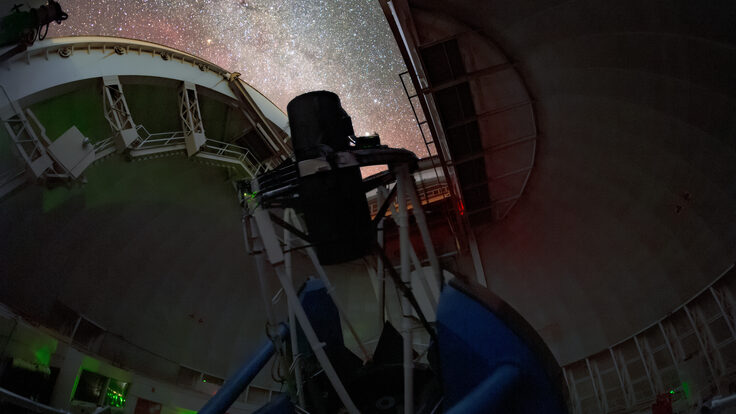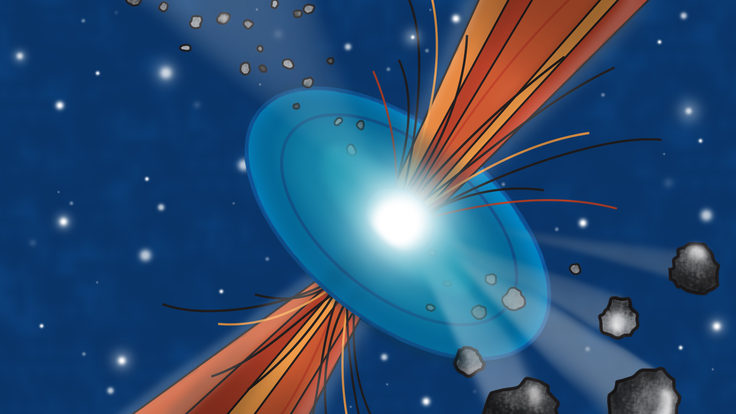Bringing science to Vietnam
by Jennifer Lauren Lee
 |
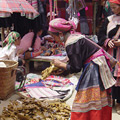 |
|
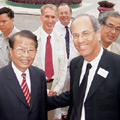 |
||
| Middle photo: Young woman from rural Bucha, Vietnam. Top-right photo: Woman examines a sandal in Bucha marketplace. Bottom-right photo: Tran Duc Luong, President of the Socialist Republic of Vietnam, and Fermilab’s Boaz Klima, at the Presidential Palace in Hanoi. | ||
| Photos courtesy of Boaz Klima | ||
You can't start a high-energy physics program in a remote third-world country overnight. But you might be able to do it in fifteen years. That is what Vietnamese and American physicists hope to do by helping Vietnamese students to become part of the worldwide particle physics community.
Nguyen Mong Giao, professor of high-energy physics at the Physics Institute of Ho Chi Minh City and a collaborator at Fermilab's DZero detector experiment, writes articles for Vietnamese magazines and newspapers about the achievements of high-energy physicists. He says his students are impressed by his lectures on the science of matter, time, and space. "They understand high-energy physics is not only a science subject," Giao says, "but also a culture subject that brings important knowledge about nature, the universe, time."
If Giao's most-impressed students consider pursuing physics studies, their home country has little to offer at the graduate level, and no PhD program. Aspiring physicists must go abroad. But in Vietnam, the average per capita income is about US$560 per year. Taking the Graduate Record Exam, the standard gateway to accredited graduate schools around the world, costs US$190–about one-third of that average income.
"There are a lot of smart students there, and they do not have the money or the opportunity to take the exams," says Kien Duc Trung Pham. In 1977, not long after the withdrawal of US forces (1973) and the unification of Vietnam under Ho Chi Minh (1975), 19-year-old Pham fled to the United States with his family. He learned English while working in a factory, studied business and marketing at the University of Colorado, then earned graduate degrees in management and international economics at Stanford University. He has been a US Senate staffer and a White House Fellow, building a business career at Tenneco, Procter&Gamble, and his own entrepreneurial firms.
Pham is also the founding executive director of the Vietnam Education Foundation (VEF), an independent federal agency created by the US Congress for educational exchanges between the countries in science and technology. Members of the Board of Directors include Senator Chuck Hegel of Nebraska and Senator John Kerry of Massachusetts, both Vietnam War veterans. The US government supports the VEF program with $5 million each year, taken from the $140 million Vietnam has been repaying the US in pre-1975 loans.
VEF sends dozens of physicists to give oral exams and interviews to about 100 pre-qualified physics students in Vietnam. Armed only with a white board and their knowledge, the students must prove their physics savvy. If they do, they will receive recommendations written in English– relatively rare in Vietnam academia. And they can gain admittance to members of the VEF Alliance: graduate schools that welcome and co-finance qualified VEF Fellows.
Brown University is a member of the VEF Alliance, and Brown graduate student Duong Nguyen is a member of the CMS team at Fermilab. Nguyen's work is centered at the lab's Silicon Detector Facility (SiDet), building components for the Compact Muon Solenoid detector of the Large Hadron Collider at CERN.
 |
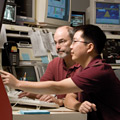 |
|
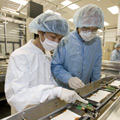 |
||
| Top-right photo: Ngoc Minh Tran works at DZero with advisor and experiment co-spokesperson Jerry Blazey of NIU. Bottom-right photo: Duong Nguyen works with department head Marcel Demarteau at SiDet. | ||
| Photos by Reidar Hahn | ||
"The opportunity is open, if you prepare for it well," Nguyen says, adding that the workload is heavier than what is expected in Vietnam. "I like working at Fermilab very much. When I work at SiDet, I can feel the teamwork, the worldwide collaboration." It's hard to work directly on a big experiment without a big accelerator in your country, Nguyen says. "But if you really want to do particle physics, you can go here, study here, and have a chance to be involved directly in the experiments."
The laboratory environment is challenging for a student from Asia with limited background in English. "The first year was very difficult," says Ngoc Minh Tran, of Northern Illinois University and DZero. "Not only the language, but the culture. Now it's okay. Studying in a foreign country, I learned a lot of things not only from academics but from culture and life. When I chose high-energy physics, Fermilab is obviously where I wanted to be."
Northern Illinois University, about 30 miles west of Fermilab, signed a Memorandum of Understanding in 2002 with the Institute of Physics at Ho Chi Minh City and other universities, including the National University of Vietnam. Under the agreement, Northern Illinois provides full tuition waivers to faculty members from the Vietnam partner institutions who are admitted to the university to pursue a graduate degree for professional development. Applicants must meet NIU graduate school and departmental requirements. Giao, who signed as representative for Vietnam, selects the students; NIU professor Gerald Blazey, DZero co-spokesperson, is the students' advisor.
Vietnamese students have worked on computer programs and detector operations, but Blazey regrets they have not been able to stay at Fermilab long enough to get "plugged in." He says, "If you're going to do this level of work, it takes a year to know what you're doing." Ultimately, the focus became "primarily that some of the students get exposure to Western science."
The NIU partnership runs through 2006; at this point, it has not yet been extended, a prospect that leaves Tran wistful. "The [Vietnamese] government does not support [physics]," he says, "but I hope that in the future the government will pay more attention to science. I wish we would have some lab like Fermilab. But I don't think that's going to happen. I hope that with support of the government more people will have the right thinking about physics. The future belongs to science."
For his part, Giao hopes the future brings permission from CERN to send students to the LHC next year. He believes "the high-energy physics field in Vietnam will be strongly developed in the coming years." That development could hinge on the destinations of students like Tran and Nguyen, as well as the difference between an "F" visa (allowing students to gather work experience in the United States after their training) and a "J" visa (returning them to their country of origin at the completion of their training).
Boaz Klima, DZero's Physics Coordinator in 2001–2003 and an active participant in the Vietnam cooperation effort since 2000, says, "When these kids finish graduate school, they will be able to go back to Vietnam and form the basis for the future."
Klima sees a cycle that must be broken at some point: to succeed, the students need support; to get support, they must show they can succeed. But he also sees great value in the current effort. "I feel this country owes them something," he says. "This is not much, but if we can help, that's great. There are many countries in similar situations as far as being poor and needing help. You help whoever you see, whoever needs you."
Click here to download the pdf version of this article.




